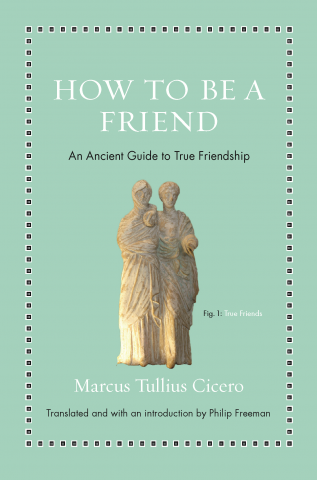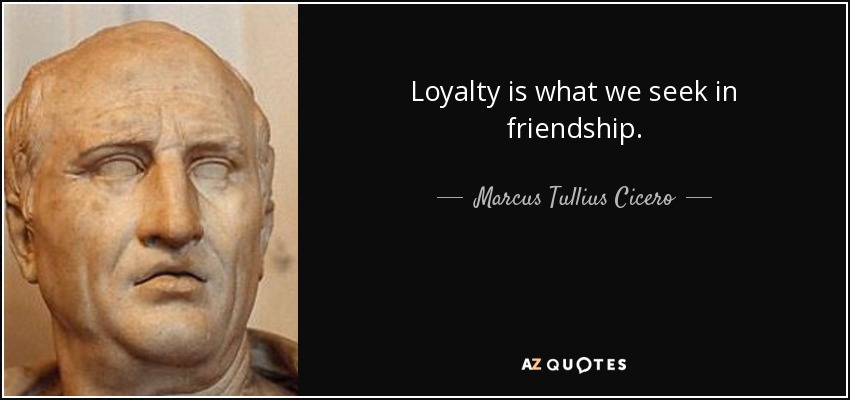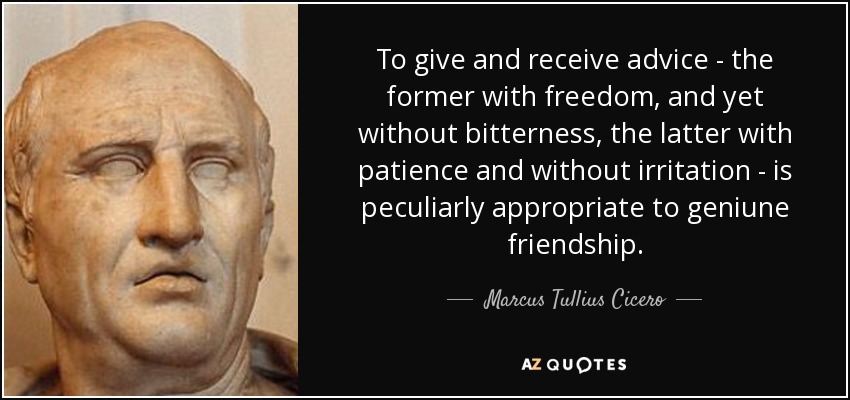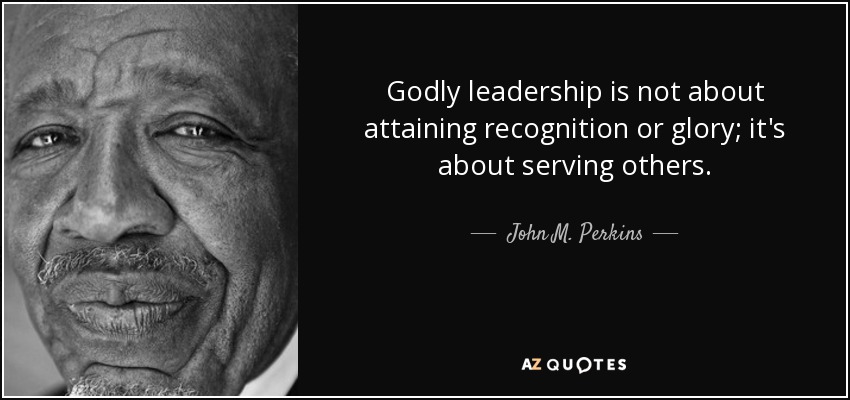Click here to return to Blog Post Intro

Cicero explains, “If you truly want to be a friend, place friendship above all other human concerns. For nothing else is in such harmony with nature, nor is anything else so helpful to us in both good times and bad… It is love [amor] from which the word ‘friendship’ [amicitia] comes, and this is the origin of goodwill. It’s certainly true that people will flatter one another in the name of friendship to gain some advantage to suit the occasion, but in sincere friendship there is nothing false, nothing pretended. Everything in real friendship is true and genuine.”
How to Be A Friend
Cicero offers ten observations about Friendship:
1. There are different kinds of friendships
We have business associates, neighbors, and any manner of acquaintances. We bind ourselves to rare friends on a much deeper level. These special friendships are necessarily rare, because they require so much time and investment of ourselves.
Friendship is stronger than kinship since goodwill can be removed from such a relationship but not from friendship. If goodwill is removed from friendship, friendship disappears. However, if you remove goodwill from kinship, it nonetheless remains.
We were created in such a way so there is a bond between all of us that grows stronger the closer we are to each other.
2. Only good people can be true friends
Real friendship requires trust, wisdom, and basic goodness. Cicero explains that true friendship is not possible except between good people.
Socrates, who would argue both sides of almost any subject, always maintained that human souls were divine. He believed that when the soul left the body, the road back to the heavens lay before it—with the easiest path awaiting souls that were most virtuous and just.
Good people act and live so that their lives give proof of:
- Faithfulness, integrity, fairness, and generosity
- Freedom from any low passion, greed, or violence
- Great strength of character
Others believe that the highest goal of life is goodness—or what we call virtue. These people hold the right view, for virtue itself gives birth to friendship and nourishes it, so that without virtue friendship is not able to exist.
Nothing is more appealing in another person than virtue, for nothing draws us more to love and admire someone.
When two people long for such goodness, they seek it out in each other and so draw closer together, so that they can enjoy the company and character of the one they love. They become rivals in doing good for each other, more desirous of doing good for the other than getting something in return—an honorable competition!
Virtue creates and preserves friendships. Virtue is the source of compatibility, stability, and permanence. When virtue has raised itself up and shown its light and has seen the same light in someone else, it is drawn to that person and receives what it gives another. From this sharing either love [amor] or friendship [amicitia] shines forth, for they both come from the same word [amare]. To love someone simply means that you care for another person without putting your own needs or advantage first.
3. We should choose our friends with care
As a general rule, we shouldn’t commit to friendships until we’ve reached an age when our character and way of living are established and confirmed.
We have to be deliberate about forming our friendships if for no other reason than that they can be very messy and painful to end if we find out the friend was not the person we thought. We should take our time, move slowly, and discover what lies deep in a person’s heart before we make the investment of self that true friendship requires.
Since friendship is so selective, we can only join together with two or at most a few people. We ought to select friends who are steady, firm, and dependable—a rather small group to choose from nowadays.
The foundation of stability and constancy that we seek in friendship is loyalty, for nothing can be stable that is disloyal. We also need to choose a friend who is honest, sociable, and sympathetic—that is, someone who is motivated by the same things as we are. All these things contribute to loyalty between people.
4. Friends make you a better person
A true friend will challenge you to become better because he appreciates the potential inside you.
What could be more foolish than for a person with an abundance of wealth, skills, and resources to acquire all the things money can buy—horses, slaves, fine clothing, expensive dining ware—and yet not acquire friends? After all, friends are the finest and most beautiful adornment of life.
The majority of people in this world see nothing good in another person unless that person can somehow profit them—as if they were buying cattle! They value a person the most who can give them the best return on their investment.
It can’t be repeated often enough—you should love after you have judged, not judge after you have loved. We pay the price for negligence in many things, but most of all for our carelessness in selecting and making friends.
In friendship, unless you see an open heart and reveal your own, you’ll have nothing certain or trustworthy. You won’t know the pleasure of truly loving or being loved, since you won’t know what true love is.
5. Make new friends, but keep the old
No one is a sweeter friend than someone who has been with you from the beginning.
Since human affairs are fragile and fleeting, we should always be seeking someone to love and to be loved by in return. For if affection and goodwill disappear from life, so does all joy.
Everyone is able to tell you how many goats and sheep they have, but not how many friends. They take great care in acquiring the former, though not the latter.
6. Friends are honest with each other
Friends will always tell you what you need to hear, not what you want them to say. You should, first of all, give as much help to each friend as you are able. But on the other hand, you should only give them what they can handle.
A good, wise man holds to these two principles of friendship:
- Never lie or deceive (for a genuine man disagrees openly with a friend rather than hiding his real thoughts)
- Always reject slander of a friend brought by another. In fact, don’t even be suspicious or believe that a friend has done something wrong.
There should be a certain pleasantness of speech and actions between two people that gives a special flavor to friendship. Severity and seriousness are impressive in their proper place, but friendship ought to be more amiable, genial, and relaxed so that it tends toward sociability and ease of every sort.
However, it should be noted that the worst sin of all is to spurn the truth and allow flattery to drive you to ruin. And so we all must use reason and care to advise our friends without harshness and chasten them without insult.
Of course, if a person’s ears are so closed that he won’t even hear the truth from a friend, he is a lost cause.
To graciously give and receive criticism is the mark of true friendship. You must offer your corrections with kindness, not harshly, and take them patiently, not with reluctance. Nothing is worse or more destructive among friends than constant flattery, fawning, and affirmation. Call it what you will, it is the mark of a weak and false-hearted man to tell you anything to please you except the truth.
With careful attention, it is possible to distinguish a flattering friend from a true one, just as with diligence we can separate something false and pretended from something genuine and true.
7. The reward of friendship is friendship itself
Cicero acknowledges that there are practical advantages to friendship—advice, companionship, support in difficult times—but at its heart true friendship is not a business relationship. It doesn’t seek repayment, and it doesn’t keep score.
We need friendship in every part of our life as much as we need the proverbial water and fire, the two necessities of life. This is not ordinary and common friendship—as pleasant and useful as that can be—but of true and pure friendship, such as that which exists among the best of friends.
There are three false views of friendship:
- The view that we should do for our friends as we would do for ourselves—is certainly false. Good men will often put themselves at a disadvantage and give up things they want and need, so that their friends, rather than themselves, can enjoy them.
- Another view that limits friendship is the expectation of an equal exchange of actions and feelings. This reduces friendship to a careful and petty calculation of credits and debits. True friendship is something richer and more abundant than that. It doesn’t check the books to see if it’s giving more than it has received.
- The view that someone should be valued by his friends just as much as he values himself—is the worst of all. For often, the spirit of friends is broken, and they have little faith that their fortunes will improve.
8. A friend never asks another friend to do something wrong
A friend will risk much for another, but not honor. Doing wrong for the sake of a friend never justifies that wrong. Remember that friendship is founded on virtue. If a friend expects you to do something evil, it is difficult for that friendship to continue.
Therefore let this be a law of friendship: Never ask a friend to do anything shameful, and don’t do anything shameful if asked.
Without accomplices, few attempt terrible deeds. Therefore when good people realize they have fallen in with such people by chance, they must know that they are not bound by friendship to commit some act of treachery.
Let this be ordained as the first law of friendship: Seek from friends only what is honorable and do for friends only what is just—but don’t wait to be asked. Let your eagerness always be present and hesitation absent. Give your honest advice freely. Among friends, always listen to the counsel of your wise companions. True friends should give faithful advice to each other, not only with frankness but with sternness if necessary.
9. Friendships can change over time
Friendships from youth will not be the same in old age—nor should they be.
Nothing was more difficult than for two people to remain friends until the end of their lives. Either the friendship would end when their lives changed somehow, or they would have a falling out over politics, as often happens, or they would simply drift apart because of some adversity or the increasing burdens of old age.
Certainly most friendships among common people end because of the desire for money, but among the better class of men friendships die because of the fight over honor and glory, which often causes the best of friends to become the worst of enemies.
As more commonly happens between ordinary friends, there is a change in character or interests or political views. We must take care that those who were once our friends don’t become our enemies. For nothing is more disgraceful than to wage war against someone you once loved.
To do this, make a great effort to see that discord doesn’t arise between you and your friends. But if it does, make it seem that the fire of your friendship burned out on its own rather than being stamped out.
10. Without friends, life is not worth living
If someone were to ascend into the heavens and gaze at the nature of the universe and the beauty of the stars, that very wonder would be bitter for him, if he did not have anyone to tell about it. Nature loves nothing that is solitary, but always inclines toward some sort of support. And the sweetest support is a very dear friend.
As Cicero says: “Suppose a god carried you far away to a place where you were granted an abundance of every material good nature could wish for, but denied the possibility of ever seeing a human being. Wouldn’t you have to be as hard as iron to endure that sort of life? Wouldn’t you, utterly alone, lose every capacity for joy and pleasure?”
How can life be worth living unless it relies on the mutual goodwill of a friend? What could be sweeter than to have someone you can dare to talk to about everything as if you were speaking to yourself? How could you enjoy the good times of life if you didn’t have someone who was as happy about your good fortune as you are?
Cicero concludes his essay by saying, “That is all I have to say about friendship. As for you, my young friends, I urge you to strive for virtue, for without it friendship cannot exist. And friendship, aside from virtue, is the greatest thing we can find in life.”
My True Friend: Jason

Jason and I met as Graduate Students at Texas A&M University in the singles department of Central Baptist Church. We both met and fell in love with our respective future brides in that class too.
When I considered this month’s focus on Friendship, I couldn’t help but think of Jason. I’ve attempted to use his name as an acronym to describe what I appreciate most about him:
J – Jesus Christ First
In college, Jason and I were both learning to follow Jesus Christ. While we both grew up in strong Christian homes, we were developing our personal faith. We also developed in a community of believers. But it was clear from the day we met that Jesus Christ was first in Jason’s life. That’s probably why I was so drawn to a true friendship with him, as Jonathan was a friend to David in 1 Samuel 20.
A – Always Encouraging
Every conversation I have with Jason, I leave feeling encouraged. That is in stark contrast to some of my key business relationships at work these days. Unfortunately, I don’t talk with Jason enough to benefit from his encouraging words. I echo Paul’s words from Colossians 4:11 when he said, “These are fellow workers for the kingdom of God who…have proved to be an encouragement to me.”
S – Sacrificial Servant
Jason is the kind of friend who would offer you the shirt off his back, if you needed it…and he wouldn’t wait for you to ask, either. He lives sacrificially, constantly giving to others and serving others, following the example of Jesus Christ.
O – Others Focused
Jason always focuses on others. In the midst of life’s challenges, he always wants to know how my family and I are doing. He genuinely cares about others and meeting their needs.
N – Never Gives Up
Jason has withstood some tough blows in life—with his Mom passing away shortly after our college graduation. Then, his father recently passed away as well. He also endured a tough time of unemployment—which spanned two and a half years—when he never gave up on God or his friends. That’s a mantra I appreciate from Jason.





